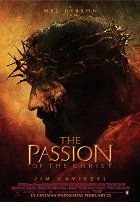Realização:
Mel GibsonArgumento:
Mel GibsonCâmara:
Caleb DeschanelElenco:
James Caviezel, Maia Morgenstern, Hristo Jivkov, Francesco De Vito, Monica Bellucci, Mattia Sbragia, Toni Bertorelli, Luca Lionello, Hristo Shopov (mais)Conteúdos(1)
As últimas 12 horas da vida de Jesus de Nazaré (James Caviezel). No meio da noite, Jesus é traído por Judas (Luca Lionello) e é preso por soldados no Monte das Oliveiras, sob o comando de religiosos hebreus, que eram liderados por Caifás (Matti Sbraglia). Após ser severamente espancado pelos seus captores, Jesus é entregue para o governador romano na Judéia, Poncio Pilatos (Hristo Shopov), pois só ele poderia ordenar a pena de morte para Jesus. Pilatos não entende o que aquele homem possa ter feito de tão horrível para pedirem a pena máxima e eram os hebreus que pediam isto. Pilatos tenta passar a decisão para Herodes (Luca de Domenicis), governador da Galiléia, pois Jesus era de lá. Herodes também não encontra nada que incrimine Jesus e o assunto volta para Pilatos, que vai perdendo o controle da situação enquanto boa parte da população pede que Jesus seja crucificado. Tentando acalmar o povo e a província, que detesta, Pilatos vai cedendo sob os olhares incriminadores de Claudia (Claudia Gerini), sua mulher, que considera Jesus um santo. (texto oficial do distribuidor)
(mais)Críticas (7)
A Paixão de Cristo é um filme íntimo, quase teatral, com um conceito de ecrã grande de tirar o fôlego. A sua essência não é o cenário histórico gigantesco, mas a impressão das cenas filmadas de forma perfecionista, situadas - seja no interior ou no exterior - em algumas dezenas de metros quadrados. O filme começa com uma cena de caça a «um jovem desesperado», continua com o seu linchamento e termina com a sua morte. Só ficamos a saber quem se esconde debaixo do capuz e quem são os outros rostos no ecrã através de flashbacks curtos durante a tortura dele. A revelação das suas identidades aprofunda a nossa relação com Jesus de Nazaré e também a nossa perceção da dor pela qual eles próprios passam. O poder do filme reside na imagem do sofrimento indescritível de um homem com um grande coração, causado por pessoas sem coração. ___ Mel Gibson escolhe o caminho honesto da narrativa, sem uma pitada de sentimentalismo. Mantém-se imparcial e desfruta literalmente do linchamento do homem. Em câmara lenta, na dor crescente do sofredor, faz-nos sentir em igual medida tanto a sua dor física como as atrocidades dos instintos sádicos dos seus carrascos. Esta abertura chocantemente fria no primeiro terço deixa-nos presos aos nossos assentos, apenas para aprofundar todo o macabro com flashbacks posteriores dos comentários espirituais de Jesus, dando-lhe significado, emoção e dimensão filosófica. O mártir e os seus carrascos tornam-se encarnações cada vez mais expressivas dos valores do bem e do mal, e juntos criam uma «obra» que mudará para sempre a história da humanidade. ___ O filme mantém um ritmo lento e dura mais de duas horas, mas não encontrará nele uma única tomada, som ou edição que não tenha o seu lugar e provoque em si a emoção necessária. É um poema hipnoticamente fluído e sombrio, com um enorme peso de urgência nas costas, que se aprofunda a cada minuto que passa. Ou desvia os olhos, ou sustém a respiração, ou reflete sobre o que foi dito.
()
I find this film hard to rate, even after a second viewing. If I were to rate only the major part of the film that precedes the journey to Golgotha, it would be 5 stars. Brilliantly played Pilate, Herod is an outright treat despite the small space and Mattia Sbragia is very convincing as the resolute Caiaphas. I really enjoyed the scenes of Pilate and Jesus together. The much criticized flashbacks are impressive and especially the one with Mary and Jesus at the table is really beautiful and full of emotions. But starting with The Road to Golgotha, Gibson's film loses its impact. Gibson made Christ a being who, by superhumanly overcoming all the immense hardships, seems implausible. I would argue that less is sometimes more, that a few slashes to the skin would be more painful and real than all those cuts covered in blood on something that used to resemble a human body. As a result, Christ’s suffering loses its human dimension. Also, the scene when a raven pecks out the eye of one of the crucified thieves has no support in the Gospels and smacks strongly of gratuitousness. Yet, I have to admit that the film has a certain amount of power, multiplied by the visit to the cinema, where everyone sat until the end credits finished rolling, which I haven't experienced for a long time. As an afterthought, I acknowledge that my original criticism about the total lack of ideas, and that it doesn't even come close to Scorsese's The Last Temptation of Christ is perhaps a bit off the mark. This film is not supposed to explain anything, to introduce characters in a clear way so that average viewers can understand. Perhaps the renowned Roger Ebert wrote it most succinctly: "This is not a sermon or a homily, but a visualization of the central event in the Christian religion. Take it or leave it.” But the question remains, is this film necessary? Gibson's artistic statement is ideally suited to a time when, thanks to the permanent threat of terrorism, the world is exposed to a clash of civilizations, a clash of religious principles, and the huge success of the film in the US can be attributed to the need for ideological refuge. And history repeats itself in cycles. The clashes among the Abrahamic religions – Judaism, Christianity and Islam – have and will continue to cause much blood and suffering. And it's not so much a problem of religion itself, but rather of the animal species called homo sapiens stupidus, which has a coded need for fight and cruelty, which is very clear in several scenes in Gibson's film. Let that be to his credit.
()
A standard large-scale film production, baroque rigid faces of the actors, an attempt at distinctive artistic stylization, self-purpose escalated brutality, excellent soundtrack.... And all this is in the service of the sacred purpose of the film. Mel Gibson and Benedict Fitzgerald have chosen a very simple script trick, wherein they put reminiscences of the long-suffering and hardship of Jesus Christ in convenient places on familiar gospel scenes to reinforce the film's message. A message that I personally consider to be the most problematic part of a newly born phenomenon. This phenomenon speaks precisely to the part of the audience that is knowledgeable about biblical themes. It speaks in a way that is not dialogical, but purely illustrative. Here is the hero, this is what the evil Pharisees and the gloating people of Jerusalem did to him, and now you must feel indebted to him. Who Christ was, what is his message to the world — that is what The Passion of the Christ deals with very sketchily. It's not a testimony, but rather just a bloody portrayal of one of the greatest stories in human history. The biggest and most impressive. Mel Gibson actually gave the best testimony of the state of contemporary American cinema. The viewer is no more than sitting and staring while the "narrator" thinks for him. No one asks you to think, ask, or interpret during the film; even the strongest — that is, Christ's struggle with doubts about his mission — must be thematized into an embarrassingly literal character of the devil. Your only mission is to monitor the flow of carefully chewed and thoughtful "pseudo-reality", which has completely lost its symbolic validity and becomes a bloodthirsty direct transmission from the greatest execution of antiquity. And so, as the blood squirted into the orchestra, the makeup-smeared James Caviezel soiled the ground with artificial raspberry juice and made throaty sounds, I remembered a medieval liturgical drama where the same story is depicted with perspective and human kindness – loosely, playfully, with imagination, and it was a hundred times more impressive. Because while this is a celebration of human life, Gibson's "masterpiece" is merely a deafening invocation of deified death. Or: a "media event" once again triumphed over artistic quality... Not as bad or as good a film as some say.
()
Personally, I'd rather watch Scorsese's The Last Temptation of Christ again, rather than this popcorn-advertising, religious pamphlet. So I'm quite shocked at myself that I actually liked it overall, despite the aforementioned. And the horrifyingly dull table scene doesn't change that.
()
No hyperactivity turning to faith and as a result fortunately no exaggerated controversy. The crucifixion is brutal and cruel, but also impressive, touching, and surprisingly grand. Its fascinating atmosphere drew me in despite some prejudices, and I am glad that ten years after its creation, Gibson's opus is finally receiving positive reviews. This film is definitely not easy to love, but it is quite easy to be amazed by it.
()
Those brutal scenes that everyone take dso much about weren't really that terrible. Rather than being naturalistic, they were just very bloody. In terms of craftsmanship, it is again precise, but that is not new for Mel Gibson. As for the content, there is nothing left but to describe it as controversial. The music is breathtaking.
()
Gibson has undoubtedly achieved what he set out to do, and it can’t be denied that the film has a powerfully immersive atmosphere and an impressive level of craftsmanship in some moments. Unfortunately, however, it fails where it wanted to be strongest: as a story about an unjust amoral judgment, about the failure of human faith and the rekindling of hope for its resurrection. Gibson relies only on the general idea that Jesus was a benevolent shepherd and that we must automatically pity him in his suffering, so he disregards any coherence of message and half-heartedly presents boring flashbacks or shocking physical torture that lasts unnaturally long and becomes the main motif of the entire film. And although I had a really big lump in my throat at the finale and watched the horror with bated breath, I don't understand why something like this was made in the first place. Or I do, for money, of course. The very idea and structure of the work are too simple and misleading to translate into something more historically and cinematically valuable or inspiring.
()

